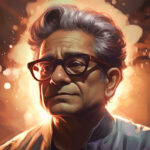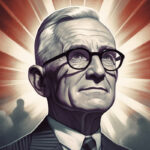History is a subject that fascinates us all. The stories of our ancestors, the triumphs and disasters of nations, all form an integral part of the human experience. World history, in particular, helps us understand our shared origins and the common threads that run through different civilizations. If you’re looking to delve deeper into this fascinating subject, consider these books, which cover different periods, regions, and themes.

Understanding the Importance of World History
Before we jump into the list, it’s worth reflecting on why world history matters. The study of the past is not just an intellectual pursuit; it has practical implications for how we live in the present. By learning about how societies have risen and fallen, how they’ve overcome challenges and adapted to new circumstances, we can gain insight into our own challenges and opportunities.
Furthermore, the study of world history can help us understand the origins of modern society. For example, by examining the ancient civilizations of Greece and Rome, we can gain a better understanding of the foundations of Western culture and democracy. Similarly, by studying the history of China, we can learn about the origins of some of the world’s oldest institutions and traditions.
How World History Books Shape Our Perspective
One of the benefits of reading world history books is that they can broaden our perspective. By exposing us to different cultures, religions, and ideologies, these books can challenge our assumptions and help us see familiar issues in a new light. For example, if you’ve ever wondered about the roots of sectarian conflict in the Middle East, reading a book on Islamic history can provide valuable context and nuance.
In addition, world history books can help us recognize the interconnectedness of different societies and cultures. By exploring the trade routes and migrations that have shaped human history, we can gain a better understanding of how different regions have influenced each other over time.
The Role of World History in Modern Society
Moreover, in an era of globalization and interconnectedness, understanding world history is more crucial than ever. By studying the past, we can gain a better appreciation of the challenges we face as a global community, from climate change to economic inequality. The lessons of history can inform our decisions and actions today, and ultimately, shape the course of the future.
Furthermore, understanding world history can help us become more informed and engaged global citizens. By learning about the struggles and triumphs of different societies, we can develop a greater sense of empathy and understanding for people from different backgrounds and cultures. This, in turn, can help us build more inclusive and equitable societies in the present and future.
In conclusion, the study of world history is a valuable and enriching pursuit that can help us gain a deeper understanding of our world and our place in it. By exploring the past, we can gain valuable insights into the present and shape the course of the future.
Top World History Books by Time Period
History is a fascinating subject that allows us to understand the past and learn from it. The following are some of the top world history books that cover different time periods and provide insight into the events, people, and cultures that shaped our world.
Ancient History
The earliest civilizations paved the way for human progress, laying the foundations for art, architecture, philosophy, and science. To understand the roots of these achievements, consider reading books like “The Rise and Fall of Ancient Egypt” by Toby Wilkinson, which explores the political, social, and cultural dynamics of one of the world’s oldest civilizations. Alternatively, “The Histories” by Herodotus, a Greek historian who chronicled the Persian Wars, provides a fascinating insight into cross-cultural interactions in the ancient world.
Ancient history is a vast and complex subject that encompasses many different cultures and civilizations. For example, the Indus Valley Civilization in South Asia was one of the first urban societies in the world, with a sophisticated system of writing, trade, and governance. Books like “The Indus: Lost Civilizations” by Andrew Robinson provide a detailed account of this fascinating civilization, its achievements, and its decline.
Medieval History
The Middle Ages, spanning roughly from the 5th to the 15th century, was a period of great change, marked by the decline of classical empires, the rise of Christianity, and the emergence of feudalism. Books like “A Distant Mirror” by Barbara Tuchman, which focuses on the 14th century Europe, offer a vivid portrayal of life in the medieval times, while also exploring the themes of war, religion, and social inequality. Alternatively, “The Crusades Through Arab Eyes” by Amin Maalouf, provides a rare perspective on the conflict between Christendom and Islam that defined much of the medieval period.
The medieval period was also marked by the flourishing of Islamic civilization, which made significant contributions to science, philosophy, and the arts. Books like “The House of Wisdom: How Arabic Science Saved Ancient Knowledge and Gave Us the Renaissance” by Jim Al-Khalili provide a fascinating insight into the achievements of Islamic scholars, who preserved and expanded upon the knowledge of ancient Greece and Rome.
Early Modern History
The early modern era, roughly spanning from the 16th to the 18th century, was marked by the exploration and colonization of the Americas, the rise of nation-states, and the scientific revolution. Books like “Guns, Germs, and Steel” by Jared Diamond, which explores the factors that led to the dominance of Western civilizations, provide a fascinating lens through which to view this period. Alternatively, “Sea of Poppies” by Amitav Ghosh, a novel set in colonial India, provides a richly detailed account of the cultural, economic, and political forces that shaped the early modern world.
The early modern period was also marked by significant social and cultural changes, such as the Protestant Reformation and the Enlightenment. Books like “The Reformation: A History” by Diarmaid MacCulloch provide a detailed account of the religious and political upheavals that defined this period, while “The Enlightenment: The Pursuit of Happiness, 1680-1790” by Ritchie Robertson explores the intellectual and cultural trends that shaped the modern world.
Modern History
The 19th and 20th centuries saw unprecedented levels of social, political, and technological change, from the Industrial Revolution to the World Wars to the rise of globalization. Books like “Sapiens” by Yuval Noah Harari, which offers a sweeping overview of human history, help us grasp the scale and scope of these transformations. Alternatively, “The War of the World” by Niall Ferguson, which explores the global impact of the 20th century conflicts, provides a sobering reminder of the high stakes of modern history.
Modern history is a vast and complex subject that covers a wide range of topics, from the rise of totalitarian regimes to the struggle for civil rights. Books like “The Origins of Totalitarianism” by Hannah Arendt provide a detailed analysis of the political and social forces that led to the rise of fascism and communism, while “The Civil Rights Movement: A Photographic History, 1954-68” by Steven Kasher offers a visual account of one of the most important social movements of the 20th century.
In conclusion, history is a subject that offers endless opportunities for exploration and discovery. Whether you are interested in ancient civilizations, medieval Europe, early modern science, or modern politics, there is a wealth of books that can help you deepen your understanding of the past and its impact on the present.
Notable World History Authors and Their Works
Jared Diamond
Jared Diamond is a Pulitzer Prize-winning author and professor of geography at the University of California, Los Angeles. His books, which span a wide range of disciplines, including anthropology and ecology, are noted for their bold, interdisciplinary approach. In addition to “Guns, Germs, and Steel,” he has authored “Collapse,” which examines the factors behind societal decline, and “The World Until Yesterday,” which contrasts traditional and modern ways of life.
Yuval Noah Harari
Yuval Noah Harari is an Israeli historian and philosopher who has gained international acclaim for his books on world history and future trends. “Sapiens,” his debut book, was a bestseller in over 40 languages and has been praised for its engaging writing style and accessible insights. He followed it up with “Homo Deus,” which explores the implications of technological advancement on the future of humanity, and “21 Lessons for the 21st Century,” which tackles contemporary challenges like nationalism, terrorism, and artificial intelligence.
Niall Ferguson
Niall Ferguson is a British historian and commentator who has written extensively on the economic, political, and social forces that shape world history. His books, which include “The Ascent of Money” and “Empire,” have been praised for their insightful analysis and provocative arguments. Ferguson is also a sought-after speaker and media personality, known for his wit and erudition.
Barbara Tuchman
Barbara Tuchman was an American historian and journalist who specialized in the study of war and diplomacy. Her books, which include “The Guns of August” and “The March of Folly,” are noted for their vivid storytelling and meticulous research. Tuchman was also a pioneer in the field of historical writing, challenging the traditional view that history should be dry and academic.
World History Books Focused on Specific Regions
Europe
Europe has played a central role in world history, from the Classical era to the present day. Books like “Postwar” by Tony Judt, which explores the social and political legacy of World War II, and “The Pursuit of Glory” by Tim Blanning, which covers the rise of the Habsburg dynasty, provide valuable insights into this complex and diverse region.
Asia
Asia, home to the world’s major religions and civilizations, has a rich and varied history. Books like “The Silk Roads” by Peter Frankopan, which traces the cultural and economic connections across the Eurasian landmass, and “The Making of Modern Japan” by Marius Jansen, which offers a detailed analysis of Japan’s transformation from feudalism to modernity, shed light on this dynamic region.
Africa
Africa, often overlooked in world history books, has a rich and diverse cultural heritage. Books like “King Leopold’s Ghost” by Adam Hochschild, which uncovers the brutal legacy of Belgian colonialism in the Congo, and “African History: A Very Short Introduction” by John Parker and Richard Rathbone, which provides a concise overview of the continent’s past, help bridge this gap.
The Americas
The Americas, shaped by indigenous civilizations, European colonization, and African slavery, have a complex and contentious history. Books like “1491” by Charles C. Mann, which challenges conventional myths about indigenous cultures before the arrival of Columbus, and “A People’s History of the United States” by Howard Zinn, which provides a critical perspective on American history from the perspective of ordinary people, provide a fresh take on this region.
Oceania
Oceania, comprising Australia, New Zealand, and various Pacific islands, has a unique and fascinating cultural heritage. Books like “The Fatal Shore” by Robert Hughes, which documents the brutal history of Australia’s penal colonies, and “Polynesia: The Mark and the Memory” by Patrick Kirch, which explores the environmental and cultural history of Polynesia, offer compelling insights into this region.
By reading these books, you can deepen your knowledge of world history and gain new perspectives on the human experience. Whether you’re interested in specific regions, time periods, or themes, there’s sure to be a book that captures your imagination. So, why not make time to discover the best world history books today?
FAQs
What are the best books on African history?
The Scramble for Africa by Thomas Pakenham, Things Fall Apart by Chinua Achebe, The Washing of Spears by Donald R. Morris, and King Leopold’s Ghost by Adam Hochschild are all fantastic books to help you learn more about African history.
What are the best books on Asian history?
The Rising Sun by John Toland, Mao’s Great Famine by Frank Dikötter, and Genghis Khan and the Making of the Modern World by Jack Weatherford are brilliant choices.
What are the best books on European history?
Some of the best books on European history include Postwar by Tony Judt, Vanished Kingdoms by Norman Davies, and Bloodlands by Timothy D. Snyder.
- The 11 Best Books About Cats You Should Read - January 16, 2024
- The 9 Best Books on Building Confidence - January 16, 2024
- Discover the 10 Best Books on the Brain - January 16, 2024








